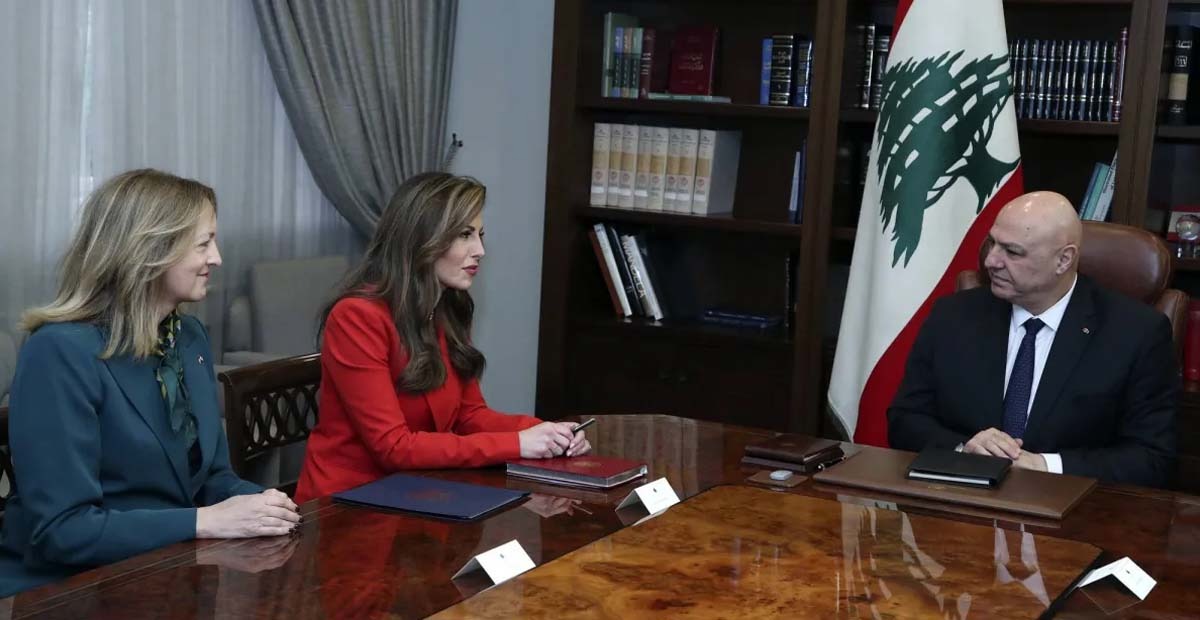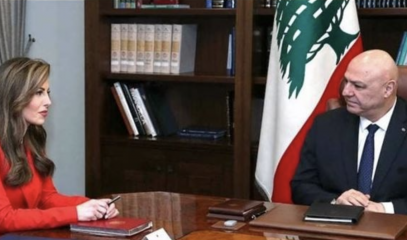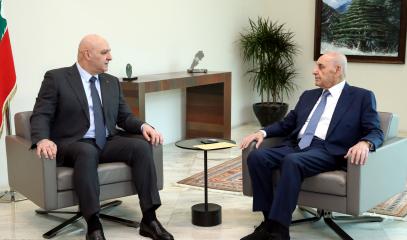Trump's envoy to Beirut to disarm Hezbollah, reform banks
The military neutralisation of the 'Party of God' and the restructuring of the institutions are at the centre of Morgan Ortagus’s visit to Lebanon. One of the unresolved issues is the failure of Israel and the pro-Iranian movement to comply with the terms of the November ceasefire. The controversial issue of "normalisation" with the Jewish state is off the agenda.
Beirut (AsiaNews) – The military neutralisation of Hezbollah and banking reform are at the heart of the recent visit to Lebanon by Morgan Ortagus, US deputy special presidential envoy to the Middle East.
Arriving in the Lebanese capital Friday evening, Ortagus held meetings with the country's leaders but also, in a rare and controversial move, with the newly appointed governor of the Banque du Liban (BDL), Karim Souaid, and the head of the Lebanese Forces, Samir Geagea.
She also lingered at the National Museum of Beirut, for a guided tour by the Minister of Culture, Ghassan Salameh.
According to observers, Ortagus left behind an official Lebanon that was "more reassured" about the time they were given to disarm Hezbollah and the nature of Lebanon’s ties with Israel.
The demand for "normalisation with Israel", cited before her arrival by some media outlets as something that could "not be postponed for long", was taken off the table.
"I did not hear her call for normalisation with Israel," Berry insisted, after reviewing the visit with the president, adding: "Even the Israelis have not discussed this subject."
However, the US embassy in a statement dispelled any ambiguity about the diplomat's objectives.
“In all her meetings, she was encouraged by the frank discussions on moving Lebanon forward into a new era -- which means disarming Hezbollah quickly, enacting reforms to end corruption, and providing an open and transparent government so all Lebanese people have faith and confidence in their state,” the Embassy said in a post.
Veteran analysts, such as Philippe Abi Akl in Ici-Beyrouth, interpret the term "quickly" to mean "by June," and linked promises of reconstruction funding once this is done.
It should be noted that on the subject of Hezbollah’s disarmament, the dispute between Lebanon and the United States relates only to the means to achieve it, not on the principle, which is agreed.
However, Lebanese President Joseph Aoun, who was the Commander of the Lebanese Armed Forces, knows all too well that disarmament must be carried out gradually and slowly to let Hezbollah become a purely political party, a process that cannot be carried out by force without endangering civil peace.
197 sites out of 263
Moreover, the total disarmament of the pro-Iranian party is already encountering resistance and differences of interpretation. According to available information, the Lebanese army has carried out operations south of the Litani River in about 197 sites out of the 263 indicated in by the ceasefire monitoring committee.
But, contrary to the wishes expressed by the United States, Hezbollah categorically refuses any media coverage of these measures.
In addition, a major problem remains with searches along or north of the Litani River. Hezbollah continues to oppose any search, dismantling or surrender of weapons in the area.
The persistent presence of Israeli troops at five strategic points in southern Lebanon, in violation of the terms of the ceasefire, justifies this intransigence. In short, neither Israel nor Hezbollah really respects the terms of the ceasefire agreed last November.
The bombing of Beirut, following the anonymous firing of two rockets against Kyriat Shmona last March, is symptomatic. The army has made arrests, investigating the sources of these anonymous launches, but no concrete results have yet been released.
Lebanon thus still lives in fear of new rocket launches from unknown sources against Israel, which would lead to further retaliation. The Israeli defence minister's threats on this matter are clear.
In addition, Israeli drones continue to shoot at members of Hezbollah and Hamas living in Lebanon almost on a daily basis, both south and north of the Litani River. For Lebanon, these are all violations of the ceasefire agreement.
Israel is even bombing containers used as temporary housing. For the government, it is clear that Israel will not let the Lebanese return and resettle in their villages until residents of northern Israel can do the same on the other side of the border.
Cash economy no more
In addition to the disarmament of Hezbollah, Morgan Ortagus’s mission is to demand Lebanon adopt reforms to restore the banking system, which collapsed in 2019. A Lebanese delegation is expected in Washington on 20 April for talks with the IMF.
The latter has asked that Lebanon first adopt two bills providing for the abolition of banking secrecy and a restructuring of the sector, which will mark the end of a jungle of 52 credit institutions, and above all, the end of the "cash economy", which facilitates the financing of terrorism.









.png)










